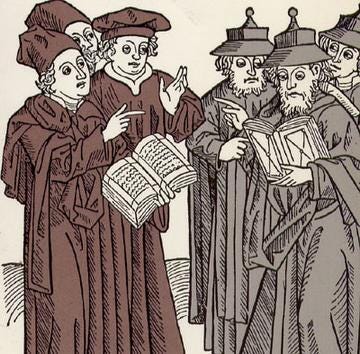On The Masoretic Text & Jerome's Hebrew Teachers
In which I prove that Jerome had believing Christians as Hebrew teachers.
In yesterday’s opening Stone Choir episode on the Septuagint, it was repeatedly asserted that Jerome learned his Hebrew from unbelieving Jews and Jewish rabbis.
Corey Mahler stated (from around the 2.01.00 mark):
“During his time in Jerusalem learning from Jews, learning the Hebrew language from them, he’s dealing with men who have explicitly rejected Christ.” (Emphasis mine).
Throughout this episode, Stone Choir’s main argument was essentially that God cursed Hebrew and destroyed it, and thus it could not form the textual basis of our Old Testament.
The Jews – the argument goes – couldn’t accept this, and sought to bring Hebrew back into the church. Jerome foolishly allowed them to do so, and thus we need to correct his error by finally replacing the Masoretic Text with the Septuagint.
Stone Choir’s argument thus hinges upon the premise being true, that Jerome drank in polluted words from unbelieving Jews, and poisoned the church with this impure stream.
This premise is not sound for three reasons:
1) Jerome learned Hebrew from Jews who converted to Christianity, not Christ-hating Jews.
Three sources prove this:
A) Our first source is Jerome’s letter to Pammachius and Oceanus, in which Jerome writes:
“Yet once more I came to Jerusalem and to Bethlehem. What trouble and expense it cost me to get Baraninas to teach me under cover of night. For by his fear of the Jews he presented to me in his own person a second edition of Nicodemus (John 3:2). Of all of these I have frequently made mention in my works.”
The comparison between Baraninas and Nicodemus suggests Jerome’s Hebrew teacher was a professing Christian.
B) Next, we have Jerome’s letter to Eustochium, in which he writes:
“When my soul was on fire with wicked thoughts, as a last resort, I became a pupil to a monk who had been a Jew, in order to learn the Hebrew alphabet.”
Thus this monk was obviously a professing Christian; far from being a Judaic rabbi.
Nor was the podcasters’ point that any Jew is necessarily by nature a Christ-denier, whether he professes Christ or not, seeing as they praise Nicholas Donin and Johannes Pfefferkorn within this same episode for leaving Judaism and embracing Christianity.
If true conversion were possible for both these men, then it was also possible for Jerome's contemporaries. And therefore the mere ethnicity (rather than the religion) of Jerome's teachers is no mark against him or his work - as the force of Stone Choir's own arguments proves.
C) Here’s a quote from Jerome’s Letter 125:
“In my youth when the desert walled me in with its solitude I was still unable to endure the promptings of sin and the natural heat of my blood; and, although I tried by frequent fasts to break the force of both, my mind still surged with [evil] thoughts.
To subdue its turbulence I betook myself to a brother who before his conversion had been a Jew and asked him to teach me Hebrew. Thus, after having familiarised myself with the pointedness of Quintilian, the fluency of Cicero, the seriousness of Fronto and the gentleness of Pliny, I began to learn my letters anew and to study to pronounce words both harsh and guttural.”
2) Jerome was able to recognize and correct the errors of unbelieving Jews.
The implication from Stone Choir is that Jerome learned uncritically from the rabbis, and allowed their lies to affect his own work on Hebrew, and that Jerome followed Origen on this, who was beholden to Philo. Yet Jerome expressly contradicts Philo, in his preface to the Hebrew Places.
Jerome writes:
“I recommend all those who wish to possess both that work and the present one, and also The Book of Hebrew Places, which I am about to publish, to make no account of the Jews and all their ebullitions of vexation. Moreover, I have added the meaning of the words and names in the New Testament, so that the fabric might receive its last touch and might stand complete. I wished also in this to imitate Origen, whom all but the ignorant acknowledge as the greatest teacher of the Churches next to the Apostles; for in this work, which stands among the noblest monuments of his genius, he endeavored as a Christian to supply what Philo, as a Jew, had omitted.” (Emphasis mine).
3) The best evidence of Jerome having an unbelieving Jewish teacher, relates to Aramaic, not Hebrew.
Jerome does mention learning Aramaic from a “Hebrew” in his preface to Daniel.
Jerome said:
“Indeed, a Hebrew was encouraging me, and he was often repeating to me by his language "Persistent work conquers all," as in me (?) I saw an amateur among them, I began again to be a student of Chaldean. And so I might confess the truth, to the present day I am better able to read and understand than to pronounce the Chaldean language.”
To this, we note: (a) this Jew may or may not have been a believer; and (b) this Jew didn’t teach him Hebrew, but Aramaic – thus irrelevant to the argument here.
I don't deny all possibility of Jerome having had contact with unbelieving rabbis, but the weight of the evidence points towards Jerome's Hebrew learning being from Christians, and not from followers of Judaism.







